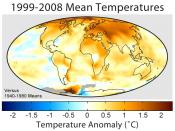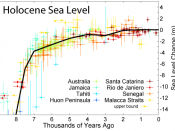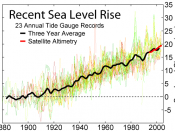John P. Holden, head of the Program on Science, Technology and Public Policy at the Kennedy School of Government at Harvard; at a press conference held on June 18th 1997, in Washington DC, stated that,"[Global warming is] the most intractable environmental problem that civilization faces"(p.1). He also stated that, "We are talking about the potential for disruption"(p.1). There seems to be about seven general areas that will be impacted, or disrupted, by an appreciable amount of global warming; and then each of these disruptions will affect a number of inter-related smaller, and more far reaching, areas. These seven general areas that will seem to be affected are: water levels, severity of weather events, human health issues, agriculture, energy usage, manufacturing and construction, and the financial sector.
By the term "water levels" we mean a rising sea level, significant differences in rainfall and greater pressures on water resources. The Global Climate Change Information Programme (GCCIP) stated in the snippet that, "If global temperatures rise...the
oceans will also heat up. This will increase the amount of water evaporation from the oceans, in turn, causing an increase in rainfall"(p. 1). The GCCIP writes that, "Water resources would generally benefit from wetter winters, but warmer summers with longer growing seasons and increased evaporation would lead to greater pressures on water resources"(p. 3). NASA and it's Earth Observation System (EOS) believes that, "[Another] concern about global warming is that melting glaciers and ice sheets will cause the sea level to rise, threatening coastal ecosystems, cities, and low-lying agricultural regions"(p. 1). The GCCIP fell that the threat would come in the forms of increased frequency of higher sea levels, tides and coastal flooding. This intrusion of sea water would increase the salination of coastal ground and surface water. There could possibly be and increase in...


